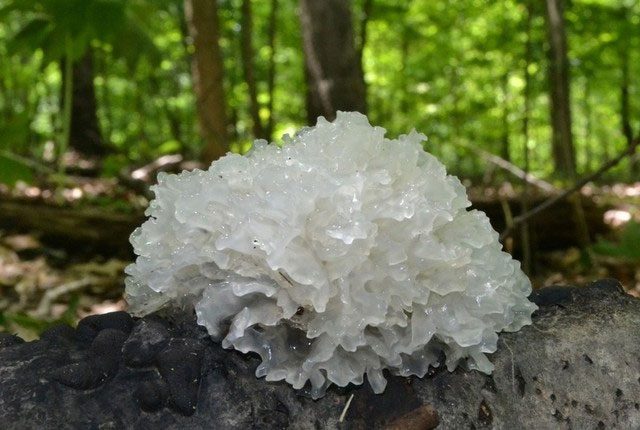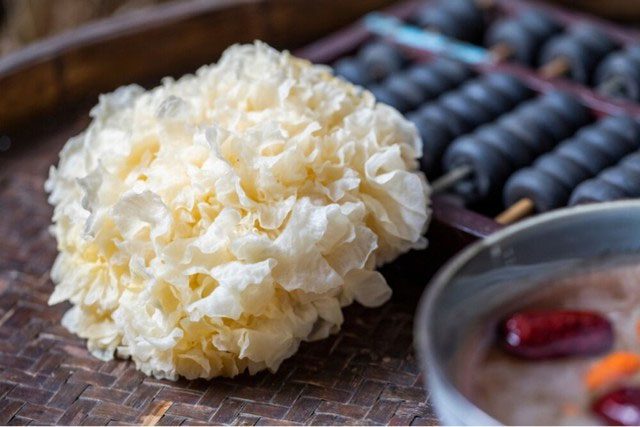This type of mushroom has been shown to prevent heart disease, diabetes, enhance collagen for beautiful skin, and improve brain health as well as the immune system.
Snow fungus is known by many names such as white fungus, cloud ear mushroom, and silver ear. Snow fungus has existed for hundreds of years and originates from tropical climates such as Brazil, Australia, New Zealand, the Pacific Islands, and some regions in Asia.
For centuries, this mushroom has been used in traditional Chinese medicine due to its benefits ranging from anti-aging skin care to immune support and disease prevention. Snow fungus has gradually become a familiar food, known for its crunchy and chewy texture, making it easy to incorporate into dishes like soups, desserts, and salads.
This mushroom is also dubbed the “poor man’s bird’s nest” because it has collagen content comparable to that of bird’s nests but is more affordable, providing numerous health benefits. Packed with minerals, fiber, antioxidants, and vitamins, this mushroom offers various effects in controlling blood sugar levels, improving cardiovascular health, and supporting the immune system. Below are the researched benefits of snow fungus.

Snow fungus has a collagen content comparable to that of bird’s nests but is more affordable.
Blood Sugar Control
Snow fungus contains a compound called polysaccharides that is particularly noteworthy. Research from South Korea has shown that this compound significantly reduces blood sugar levels and improves insulin sensitivity in individuals with type 2 diabetes.
Additionally, studies conducted in 2015 and 2016 revealed that snow fungus could inhibit the activity of aldose reductase. This enzyme, when elevated, can cause damage to the eyes and nerves in individuals with diabetes.
Reducing Heart Disease Risk
Atherosclerosis is the buildup of plaque in the arteries and is considered a risk factor for high blood pressure and stroke. The primary cause of atherosclerosis is the oxidation of harmful LDL cholesterol.
A study in 2014 in South Korea demonstrated that the antioxidants found in snow fungus can prevent the oxidation of LDL cholesterol. This helps protect the body against cardiovascular diseases.
Improving Skin Health
Snow fungus is highly favored in the beauty industry due to its anti-aging and moisturizing properties. The polysaccharides in snow fungus help reduce water loss and collagen depletion in the skin, especially after exposure to sunlight or ultraviolet rays. Moreover, snow fungus can act as a natural moisturizer and wrinkle reducer for the skin.
Enhancing Brain Health
According to research from China, the polysaccharides in snow fungus may protect brain cells from nerve damage and degenerative diseases. Furthermore, snow fungus has also been shown to reduce the risk of developing Alzheimer’s disease.
A study in South Korea lasting 8 weeks had 75 participants consume snow fungus daily. The results indicated a significant increase in their scores on memory-related questions. Similarly, another study in South Korea in 2007 demonstrated that extracts from snow fungus could significantly reverse drug-induced memory loss.

Snow fungus is relatively safe for consumption.
Boosting Immune Health
According to Healthline, the bioactive compounds in snow fungus can stimulate certain cells that protect your immune system. A study from China in 2014 concluded that a protein found in white fungus can stimulate the activity of macrophages—cells capable of destroying bacteria and removing damaged tissues.
Precautions When Using Snow Fungus
Snow fungus is relatively safe for consumption. However, pregnant women, individuals with diarrhea, phlegm, or cold cough should avoid consuming snow fungus to prevent side effects.
Additionally, it is advised not to eat it raw or to search for snow fungus in the wild to avoid ingesting toxic mushrooms. Snow fungus should be soaked, washed thoroughly, and cooked before use.


















































